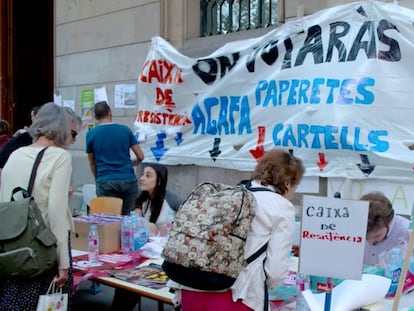The Catalan police force must carry out its legal duties
Regional government calls illegal referendum, then says public order could be a problem

As October 1 draws closer, there are growing question marks about how the Mossos d¡¯Esquadra, the Catalan police force, will act on the day of the illegal independence referendum that¡¯s been called by the Catalan government. Will they fulfill their duty of loyalty to the laws derived from the Constitution and the Estatut? Or will they support, even if it is in a passive way, the disruptive coup fomented by their political bosses? Although the history of this law enforcement agency shows a tradition of respect for the law, some of the hesitations we have witnessed in recent days make this a justified question.
The Mossos, like all other agencies, are part of the State, and must unequivocally submit to judicial power
The Mossos are Catalonia¡¯s integral police force as per Section 150.2 of the Spanish Constitution, which delegates this state power to the regional government. It is a judicial police force at the service of judges and prosecutors in crime prevention and investigation; it is also a symbol of Catalan self-government and of its inclusion as an integral part of the State¡¯s powers: besides being the Catalan police, the Mossos are an indivisible part of the Spanish state¡¯s law enforcement agencies.
As such, they are bound to guarantee the normal development of Spain¡¯s democratic, constitutional and statutory legislation in Catalonia, and to ensure that laws, norms and judicial decisions are observed. The very idea that the Mossos could fail to perform this duty, even if through a passive or low-profile form of disobedience, is astounding, because it would mean denying the very reason for their own existence. A law enforcement agency that disobeys the law, or prevents judicial decisions from being enforced, immediately ceases being a law enforcement agency.
The real gravity of the situation lies in the fact that the Mossos¡¯ political chiefs are now talking about the possibility of seeing disruption to public order on October 1. If this is indeed foreseeable and even likely, then a responsible government must act to prevent it. And there is no better way to do this than to suspend the event that is the root cause of this foreseeable unrest ¨C that is, an illegal, tension-filled vote that looks like it could become disorderly.
The very idea that the Mossos could fail to perform their duty is astounding, because it would mean denying the very reason for their own existence
What is entirely unacceptable ¨C and evidence of the absurd situation we find ourselves in ¨C is that the same regional government that breaks the law and refuses to obey the Constitutional Court, now intends to coordinate the police operation to prevent the referendum from taking place, following orders from the same prosecutors and judges that it is ignoring. That is why the reasoning employed by the Mossos¡¯ top brass, shielding itself behind allegedly technical assessments about public order concerns, does not hold up to scrutiny.
Whether it is the Catalan government or any other body that calls an illegal act and intends to carry it out without permission from the authorities, the idea of preemptively validating its illegality over the hypothetical existence of public disorder risks would mean to cancel all possibility of coercion against those acts; it would leave police forces without a reason for being; it would put the rule of law on hold, or make its enforcement dependent on the degree of force employed in street crimes.
Faced with a challenge against our constitutional order of the magnitude that we are witnessing at the moment, the kind of delay tactics and exculpatory arguments being used by the Catalan government are not acceptable. The Mossos, like all other agencies, are part of the State, and must unequivocally submit to judicial power.
English version by Susana Urra.
Tu suscripci¨®n se est¨¢ usando en otro dispositivo
?Quieres a?adir otro usuario a tu suscripci¨®n?
Si contin¨²as leyendo en este dispositivo, no se podr¨¢ leer en el otro.
FlechaTu suscripci¨®n se est¨¢ usando en otro dispositivo y solo puedes acceder a EL PA?S desde un dispositivo a la vez.
Si quieres compartir tu cuenta, cambia tu suscripci¨®n a la modalidad Premium, as¨ª podr¨¢s a?adir otro usuario. Cada uno acceder¨¢ con su propia cuenta de email, lo que os permitir¨¢ personalizar vuestra experiencia en EL PA?S.
?Tienes una suscripci¨®n de empresa? Accede aqu¨ª para contratar m¨¢s cuentas.
En el caso de no saber qui¨¦n est¨¢ usando tu cuenta, te recomendamos cambiar tu contrase?a aqu¨ª.
Si decides continuar compartiendo tu cuenta, este mensaje se mostrar¨¢ en tu dispositivo y en el de la otra persona que est¨¢ usando tu cuenta de forma indefinida, afectando a tu experiencia de lectura. Puedes consultar aqu¨ª los t¨¦rminos y condiciones de la suscripci¨®n digital.










































